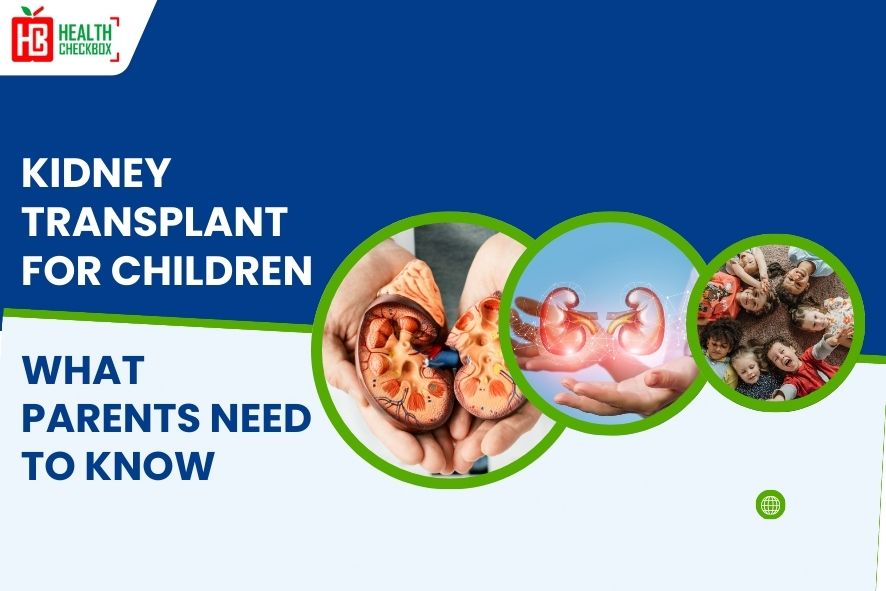When your child’s excretory organs are infected or damaged kidney transplant can be contemplated. The kidneys are vital organs and help in removing waste, salt, and other harmful products from the body. In this blog, we will analyze the procedure of kidney transplant for children including its causes, and explore how to care for children after surgery.
The parent or guardian needs to give a written declaration before proceeding with this medical surgery. It is to be noted that this procedure is a treatment and not a cure. To know more about the treatment plans, talk about it with your doctor. If your kid is 2 years and above, this renal transplant can be received from either a living or deceased donor.
Causes of Kidney Failure in Children
Take a look at the causes of Kidney Failure in Children:
- Lack of water
- If the excretory organs do not get enough water, then lack of oxygen affects the proper functioning of the kidneys.
- Blood loss
- Excessive bleeding might cause the kidneys to get less blood.
- Urinary tract getting blocked
- This acts as a drainage to the body. When it is infected, there is a problem in passing urine and this may exert pressure on the kidneys.
- Drugs
- Some drugs can harm the kidneys including:
- Immunosuppressants, NSAIDs, and antibiotics.
- Some drugs can harm the kidneys including:
- Hemolytic Uremic Syndrome (HUS)
- This syndrome is caused by a certain bacteria called E. coli.
- This is an infection in the kidney’s tiny structures and veins that can get blocked and cause difficulty in individuals.
- Trauma
- Kidney failure may result from a serious physical injury to the kidneys.
- Hereditary diseases
- Alport syndrome is one of the renal diseases that is congenital.
- Birth problems
- Kidney illness can result from certain birth defects.
Tips for Parents on Kidney Transplant Surgery in Children
Having a prolonged disease such as with kidneys can be a problem for children. All the below-mentioned concerns can cause stress in children including:
- Dialysis,
- Surgery, and
- Immunosuppressant medication.
These must be explained to the children. How the parent plans to make them aware so that the daily routine in the family is not disturbed.
Some factors that can be taken into consideration in the kidney transplant are as:
- Consulting a Doctor
- A surgeon should be consulted for the procedure and all the facts and full consideration of the transplant surgery should be discussed before the procedure.
2. Visit to the hospital
- The parent should make sure the child is not afraid of the surgery and its after-effects.
- The parent should see that the child reaches the hospital in loose clothes.
- The parent should be there when the surgery goes on.
- Also, he or she should be there for any emergency case and the availability of drugs.
- The surgery can last for about 4 to 5 hours.
3. Discharge from the hospital or Post-treatment
- The parent should be in the hospital till the child is relieved from the hospital.
- Once the child reaches home, the parent should ensure that proper care is taken of the kid.
How to Care for the Child at Home?
Kidney transplant for children is very crucial for parents and it will be more difficult after surgery. To help you in this situation, we provide a plan who help you take care of your children:
Diet
A healthy food that is rich in fiber, whole grains, fruits, and vegetables should be given to the child.
Doctor visit
The child needs regular follow-up schedules to check the development of the kidney. So the parent should make sure the child is taken to the doctor at regular intervals.
Medications
- Immunosuppressants commonly known as anti-rejection medications will have to be given to the child daily to keep the body from rejecting the new kidney.
- Intake of these medications can increase the risk of infection as well as:
- Acne that may worsen with time
- Gain in weight
- Mood swings
- Problem in sleep
Activities
- The parent should ensure the child limits his or her physical activities. Also, the guardian should tell the child to keep the surgery area clean and dry.
- Washing of the hands before each meal should be encouraged.
- Age-related activities can be resumed after 4 to 6 weeks of surgery. After eight weeks, the child can do moderate exercises, such as walking, cycling, or jogging.
- The child should be made to stay away from pets as these can carry certain germs. If necessary, the doctor can be consulted when it will be safe for the child to play with pets.
- Many of the side effects gradually improve with time including:
- acne,
- sleep trouble, and
- mood swings
Ensure that the child has taken the prescribed drugs in time. Do not change or stop any medications without consulting the doctor. Educate your child, on the importance of taking medications in time and as directed.
Life Expectancy of a Child Post Kidney Transplant
In general, the half-life of renal transplants in children is 12-15 years. Therefore children with End-Stage Renal Disease frequently require more than one renal transplant in their lifetime.
Conclusion
Having a renal transplant will make sure your child will have to stay away from dialysis. This takes up a lot of time and can also negatively affect the school life. Children with End-Stage Renal Disease may require more than one renal transplant in their lifetime.

